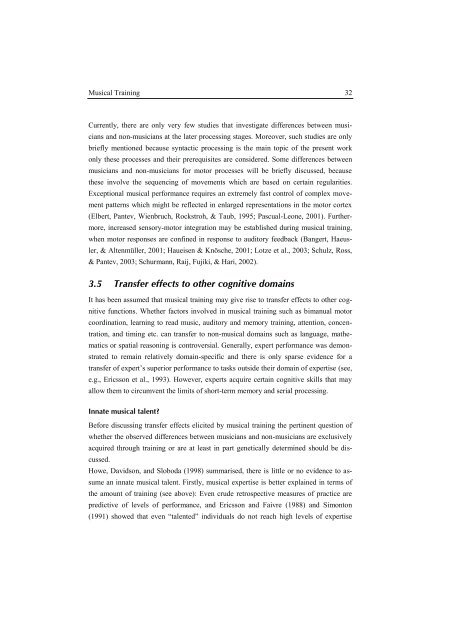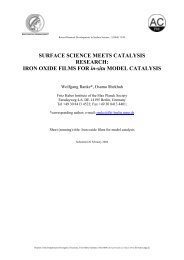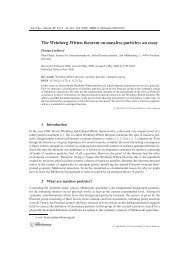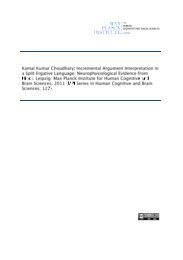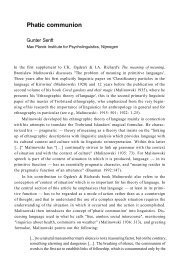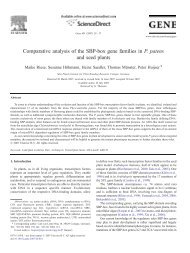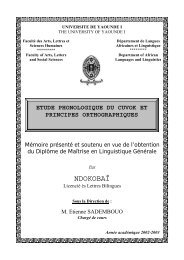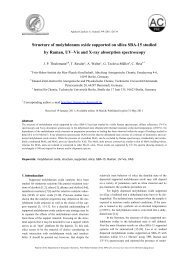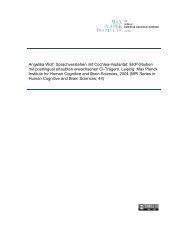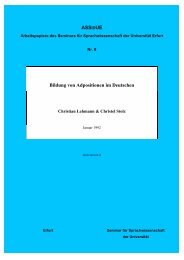Neural Correlates of Processing Syntax in Music and ... - PubMan
Neural Correlates of Processing Syntax in Music and ... - PubMan
Neural Correlates of Processing Syntax in Music and ... - PubMan
You also want an ePaper? Increase the reach of your titles
YUMPU automatically turns print PDFs into web optimized ePapers that Google loves.
<strong>Music</strong>al Tra<strong>in</strong><strong>in</strong>g 32<br />
Currently, there are only very few studies that <strong>in</strong>vestigate differences between musicians<br />
<strong>and</strong> non-musicians at the later process<strong>in</strong>g stages. Moreover, such studies are only<br />
briefly mentioned because syntactic process<strong>in</strong>g is the ma<strong>in</strong> topic <strong>of</strong> the present work<br />
only these processes <strong>and</strong> their prerequisites are considered. Some differences between<br />
musicians <strong>and</strong> non-musicians for motor processes will be briefly discussed, because<br />
these <strong>in</strong>volve the sequenc<strong>in</strong>g <strong>of</strong> movements which are based on certa<strong>in</strong> regularities.<br />
Exceptional musical performance requires an extremely fast control <strong>of</strong> complex movement<br />
patterns which might be reflected <strong>in</strong> enlarged representations <strong>in</strong> the motor cortex<br />
(Elbert, Pantev, Wienbruch, Rockstroh, & Taub, 1995; Pascual-Leone, 2001). Furthermore,<br />
<strong>in</strong>creased sensory-motor <strong>in</strong>tegration may be established dur<strong>in</strong>g musical tra<strong>in</strong><strong>in</strong>g,<br />
when motor responses are conf<strong>in</strong>ed <strong>in</strong> response to auditory feedback (Bangert, Haeusler,<br />
& Altenmüller, 2001; Haueisen & Knösche, 2001; Lotze et al., 2003; Schulz, Ross,<br />
& Pantev, 2003; Schurmann, Raij, Fujiki, & Hari, 2002).<br />
3.5 Transfer effects to other cognitive doma<strong>in</strong>s<br />
It has been assumed that musical tra<strong>in</strong><strong>in</strong>g may give rise to transfer effects to other cognitive<br />
functions. Whether factors <strong>in</strong>volved <strong>in</strong> musical tra<strong>in</strong><strong>in</strong>g such as bimanual motor<br />
coord<strong>in</strong>ation, learn<strong>in</strong>g to read music, auditory <strong>and</strong> memory tra<strong>in</strong><strong>in</strong>g, attention, concentration,<br />
<strong>and</strong> tim<strong>in</strong>g etc. can transfer to non-musical doma<strong>in</strong>s such as language, mathematics<br />
or spatial reason<strong>in</strong>g is controversial. Generally, expert performance was demonstrated<br />
to rema<strong>in</strong> relatively doma<strong>in</strong>-specific <strong>and</strong> there is only sparse evidence for a<br />
transfer <strong>of</strong> expert’s superior performance to tasks outside their doma<strong>in</strong> <strong>of</strong> expertise (see,<br />
e.g., Ericsson et al., 1993). However, experts acquire certa<strong>in</strong> cognitive skills that may<br />
allow them to circumvent the limits <strong>of</strong> short-term memory <strong>and</strong> serial process<strong>in</strong>g.<br />
Innate musical talent?<br />
Before discuss<strong>in</strong>g transfer effects elicited by musical tra<strong>in</strong><strong>in</strong>g the pert<strong>in</strong>ent question <strong>of</strong><br />
whether the observed differences between musicians <strong>and</strong> non-musicians are exclusively<br />
acquired through tra<strong>in</strong><strong>in</strong>g or are at least <strong>in</strong> part genetically determ<strong>in</strong>ed should be discussed.<br />
Howe, Davidson, <strong>and</strong> Sloboda (1998) summarised, there is little or no evidence to assume<br />
an <strong>in</strong>nate musical talent. Firstly, musical expertise is better expla<strong>in</strong>ed <strong>in</strong> terms <strong>of</strong><br />
the amount <strong>of</strong> tra<strong>in</strong><strong>in</strong>g (see above): Even crude retrospective measures <strong>of</strong> practice are<br />
predictive <strong>of</strong> levels <strong>of</strong> performance, <strong>and</strong> Ericsson <strong>and</strong> Faivre (1988) <strong>and</strong> Simonton<br />
(1991) showed that even “talented” <strong>in</strong>dividuals do not reach high levels <strong>of</strong> expertise


